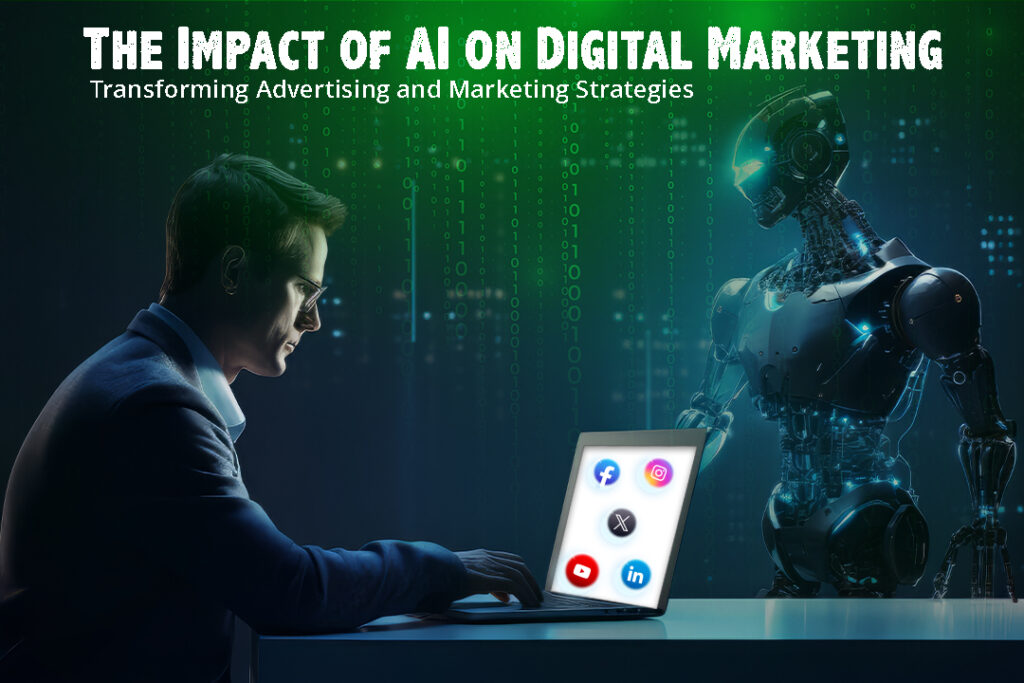
Artificial Intelligence (AI) has emerged as a game-changer in the digital marketing landscape, fundamentally altering how brands approach advertising and marketing. This technology, once considered the stuff of science fiction, is now at the forefront of driving efficiency, personalization, and innovation in marketing strategies. From automating routine tasks to delivering hyper-targeted content, AI is reshaping the industry in profound ways.
Personalized Customer Experiences:
One of the most significant impacts of AI on digital marketing is the ability to deliver personalized customer experiences at scale. AI algorithms analyze vast amounts of data, including browsing behavior, purchase history, and demographic information, to create highly customized content. This level of personalization was previously unattainable, but AI makes it possible to deliver tailored messages to the right audience at the right time.
For instance, AI-driven recommendation engines, like those used by Amazon and Netflix, suggest products and content based on individual preferences. This not only enhances the customer experience but also drives higher engagement and conversion rates. Marketers are leveraging AI to create personalized email campaigns, dynamic website content, and targeted social media ads that resonate with specific audience segments, resulting in more effective marketing strategies.
Enhanced Targeting and Segmentation:
AI’s ability to process and analyze large datasets enables marketers to achieve unprecedented levels of targeting and segmentation. Traditional demographic-based segmentation is being replaced by more sophisticated AI-driven approaches that consider behavioral patterns, psychographics, and real-time data. This allows advertisers to reach audiences with a higher likelihood of conversion, optimizing ad spend and improving return on investment (ROI).
Programmatic advertising, which uses AI to automate the buying and selling of ad space, is a prime example of enhanced targeting. AI algorithms analyze user data to determine the best ad placements in real-time, ensuring that ads are shown to the most relevant audiences. This automated approach reduces wastage and increases the efficiency of digital advertising campaigns.
Automation of Routine Tasks:
AI is also revolutionizing the way marketers handle routine and repetitive tasks. By automating processes like content creation, social media scheduling, and email marketing, AI frees up valuable time for marketers to focus on strategy and creativity. Tools like chatbots and AI-powered customer service platforms provide instant responses to customer inquiries, improving customer satisfaction while reducing the workload for human agents.
Content creation, once a labor-intensive process, is now being augmented by AI. Tools like OpenAI’s GPT can generate high-quality content based on input data, enabling marketers to produce blogs, social media posts, and even video scripts at scale. While human oversight is still crucial to ensure quality and relevance, AI is proving to be an invaluable assistant in content marketing.
Predictive Analytics and Decision-Making:
AI is enhancing marketers’ ability to predict future trends and consumer behavior, thanks to its advanced data analysis capabilities. Predictive analytics, powered by AI, allows marketers to anticipate customer needs, optimize pricing strategies, and forecast campaign performance. This data-driven approach leads to more informed decision-making and the ability to adapt strategies in real-time.
For example, AI can analyze historical data to predict which products are likely to be in high demand during specific seasons or events. This enables marketers to plan inventory, allocate budgets, and design promotional campaigns more effectively. Moreover, AI-driven insights help in identifying emerging trends, allowing brands to stay ahead of the competition.
Conclusion:
The impact of AI on digital marketing is undeniable, driving a shift towards more efficient, personalized, and data-driven strategies. As AI continues to evolve, its role in advertising and marketing will only grow, offering new opportunities for brands to connect with consumers in meaningful ways. For marketers, embracing AI is not just an option but a necessity in staying competitive in the rapidly changing digital landscape. Whether through enhanced targeting, automation, or predictive analytics, AI is setting the stage for the future of digital marketing
